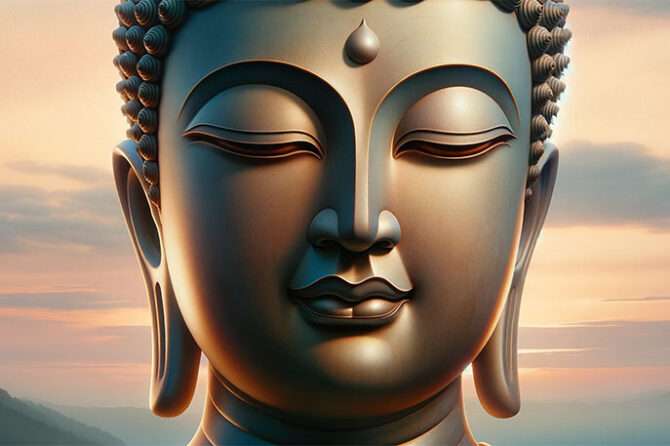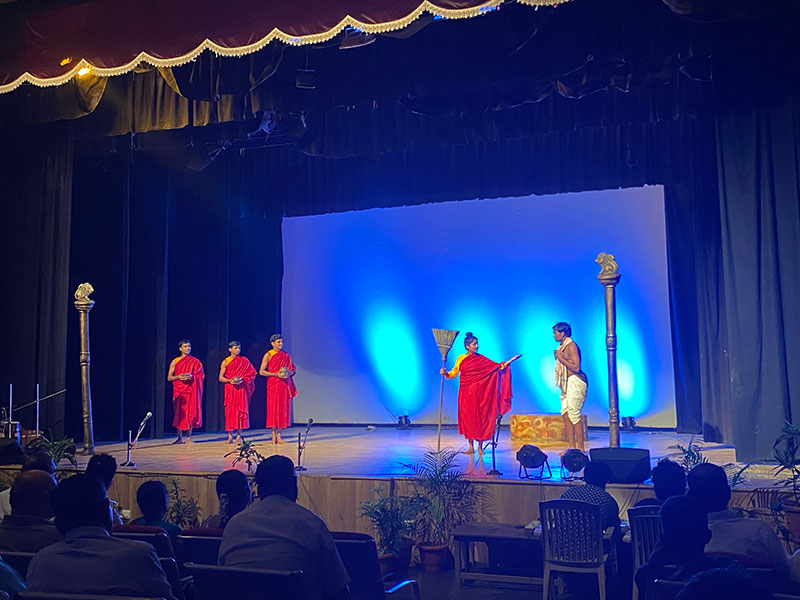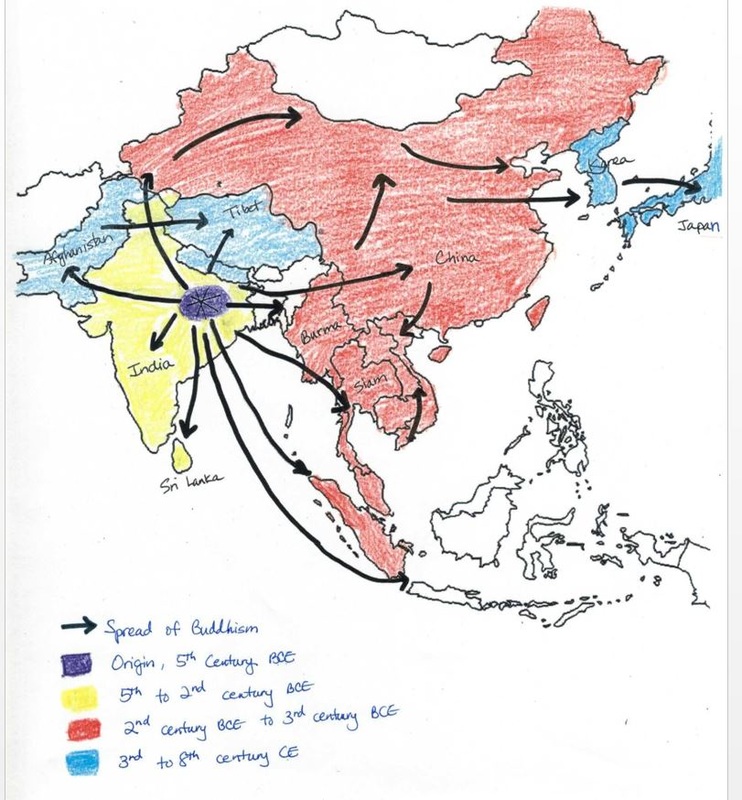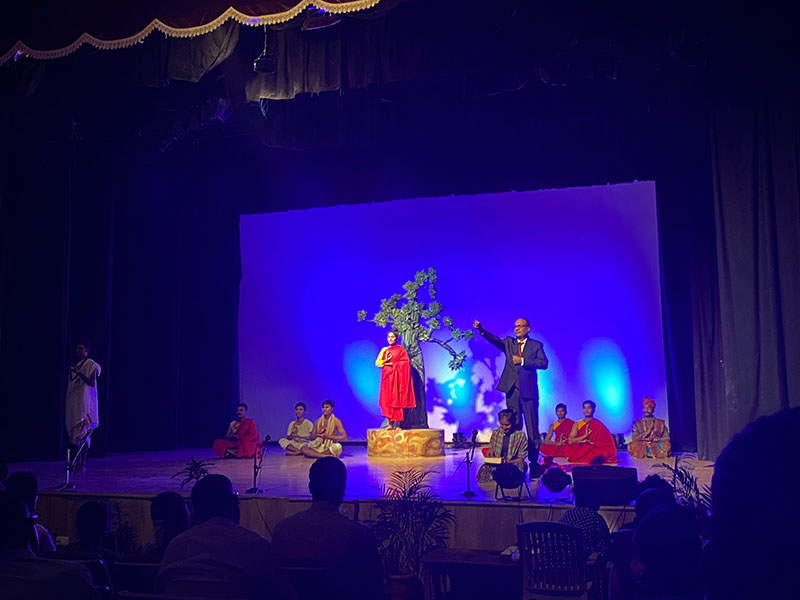
- He did not perform any miracles.
- He was not met by any divine angels.
- He did not bring any heavenly commandments.
- He did not convert anyone by force or coercion.
- He did not speak of any gods, monotheistic or polytheistic.
- He did not carry any swords and did not conquer any lands.
- He did not claim to be a prophet conveying a god’s message.
- He did not colonize any country and make religious conversions.
- He did not demand any regular acts of devotion or worship rituals.
- He did not leave behind any exclusive written scriptures or sacred texts.
- He did not speak of any day of judgment and the afterlife — the Eschatology.
In a world where the might of empires is often measured by the strength of their armies, the wealth of their treasuries, or the expanse of their territories, the legacy of Siddhartha Gautama, known as the Buddha, stands apart. A prince who renounced the possibility of worldly power for an internal quest for truth, Buddha’s influence has reached far beyond the ancient kingdoms of the Indian subcontinent, permeating global consciousness.
Gautama Buddha, a sage on whose teachings Buddhism was founded, was born into the opulent life of an Indian prince in the 5th to 4th century BCE. Yet, he found the glitter of a royal life unfulfilling amidst the inescapable realities of aging, sickness, and death. His journey toward enlightenment began with a profound sense of empathy and a quest to overcome human suffering.

The Buddha did not speak of gods, neither monotheistic nor polytheistic. He made no claims of prophecies, nor did he assert that his teachings were revelations from a divine entity. There were no divine commandments, no eschatological promises of judgment and afterlife, no mandates for rituals of worship, and no calls for religious conversions by sword or coercion. The Buddha’s approach was markedly introspective and focused on the human condition.

The religion that bears his name did not spread through conquest or colonization but through the persuasive power of its philosophy and practice. Buddhism is now the fourth largest religion in the world, predominant in 16 countries and embraced by millions globally. The enduring appeal of Buddhism, particularly the practice of mindfulness, resonates with many who seek peace and understanding in the tumult of the modern world.

The recent drama, “Buddhana Belaku,” or “Buddha’s Light,” organised by my brother Prof. Dr. A. B. Ramachandrappa under the auspices of Manava Bandhutva Vedike and Jarakiholi Foundation, was a testament to this enduring appeal. The performance, though carried by amateur actors, was a resplendent portrayal of the Buddha’s life and the transformative journey of Emperor Ashoka, who, inspired by Buddha’s message, embraced the path of non-violence and spread the Dharma after a life of conquest.

The Four Noble Truths are the bedrock of Buddhist teaching: the truth of suffering, its origin, cessation, and the path leading to its cessation. The Eightfold Path provides practical guidance for ethical and mental development to understand the truth about all things. The concepts of Karma and Rebirth posit that one’s actions in this life echo into the next, and Nirvana represents the ultimate goal – a state of liberation and freedom from suffering.

The Buddha’s teaching of Anatta, or non-self, challenges the existence of a permanent, unchanging self. Anicca, or impermanence, observes that all things are in a state of flux, and Dukkha, the acknowledgment of suffering, is inherent to life. The principle of Dependent Origination explains that all phenomena arise in dependence upon other phenomena, and the Middle Way advocates a balanced approach to life, avoiding the extremes of self-indulgence and self-mortification.
The geographical spread of Buddhism from its origins in the Indian subcontinent to Central Asia, Southeast Asia, East Asia, and later to the West, is a story not of force, but of the compelling nature of its insights into the human experience. The Sangha, or community of practitioners, and the Dharma, or teachings, have provided a sense of solace and direction to countless individuals throughout history.

The core teachings and practices of Buddhism have remained consistent across its various sects. The simplicity and profundity of the Buddha’s teachings offer a pathway to understanding the nature of reality and the means to end suffering. The path he proposed is meticulous and demanding, requiring rigorous self-discipline, constant mindfulness, and deep compassion.
In contemporary times, the world finds itself at the crossroads of numerous crises, from environmental degradation to social unrest. The message of the Buddha, emphasizing peace, empathy, and the interconnectedness of all life, has perhaps never been more relevant. The appeal of Buddhism lies in its ability to transcend cultural and religious boundaries, offering a philosophy of life that advocates for inner transformation as the means to change the world.

Buddhism’s growth and adaptation over millennia underscore its flexibility and universality. As it continues to spread, the essence of its teachings remains untouched, even as it takes on new forms and expressions in the modern era. The mindfulness movement, inspired by Buddhist meditation practices, has found its way into healthcare, education, and corporate life, testifying to the practical applicability of the Buddha’s insights.

The Buddha’s journey from a sheltered prince to an enlightened teacher is a narrative of radical transformation that has inspired countless individuals to seek meaning beyond material wealth and societal expectations. It is a journey that begins and ends within the human heart, calling for a revolution not of politics or technology, but of consciousness.

The legacy of Siddhartha Gautama endures not because of the might of empires or the zeal of missionaries, but because of the intrinsic value of the wisdom he imparted. It is a legacy that speaks to the potential for enlightenment that lies within us all, a call to awaken to the truths of our existence and find peace in the clarity of understanding. As the Buddha himself might have suggested, the most profound revolutions are those that take place within the silence of one’s own mind, radiating outward into the world.
Prof. Dr. Prahlada N. B
13 November 2023
Chitradurga.

















Prahlada Sir 💐
Buddha’s teachings are
Brilliant 🤩…
Because , it is free from bias
to all living creatures.
Buddhist virtue of
‘renounciation’ & also
Buddhist practice of
‘moderation’ in eating
are worth emulating .
Buddhist core principle is
‘mindfulness’ ie,
recollection &
remembering, &
attaining inner
peace.
Being the the fourth largest
Replyreligion in the world,
Buddhism, also known as
Buddha dharma &
Based on the principle of
AHIMSA
ie, causing no harm
to any living being,
Becomes all the more
relevant in today’s
world,
Besieged with war, terror &
to horror slaying of
innocent lives
☠️👏.